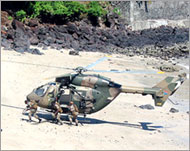Comorans slow to cast their votes
Comorans are voting in the final round of a presidential election dominated by concerns over poverty, corruption and a yearning to break with their coup-ridden past.

Voters on the Indian Ocean archipelago of 670,000 people will choose between three candidates in a poll it is hoped will end a history of overthrows led by mercenaries and inter-island conflicts since independence from France in 1975.
A total of 309,957 people were registered to vote across the three islands. But voting got off to a slow start, with some polling stations still awaiting ballot papers an hour after the polls opened. In the capital, Moroni, just five out of 20 stations had received any voters by 7am, AFP reported.
The front-runner is Ahmed Abdallah, a popular religious leader and former member of parliament nicknamed Ayatollah because of his schooling in Iran.
A businessman and keen basketball player, he has promised to end corruption, create employment and build housing for Comorans living in straw shacks. Comoros is one of the world’s poorest countries.
The other contenders are Mohamed Djaanfari, a former pilot in the French military, and Ibrahim Halidi, a candidate backed by outgoing president Azaly Assoumani.
Change of power
Political analysts say the vote will test whether a power-sharing pact signed between the islands in 2001 can bring their first peaceful change of power, ending a string of 19 coups or coup attempts, including four by French mercenary Bob Denard.
Under the deal, each of the three islands in turn assumes the rotating federal presidency every four years. Azaly is from the main island, Grande Comore, and Anjouan takes it this time followed by the smallest, Moheli, in 2010.
 |
|
South African soldiers arrived on |
Minor skirmishes have been reported in the run-up to this round. On May 5, men with machetes stormed two radio stations on Grande Comore forcing them off air for 24 hours.
Some Comorans doubt whether Azaly, who took power in a bloodless coup in 1991 and was elected in 2002, will go peacefully. However, diplomats say he is not likely to undo a peace deal he helped engineer.
Several hundred extra African Union soldiers and two helicopter gunships arrived in Moroni from South Africa on Saturday to boost an existing 460-strong force.
They were deployed across the three islands to monitor the vote and prevent abuses by the army.